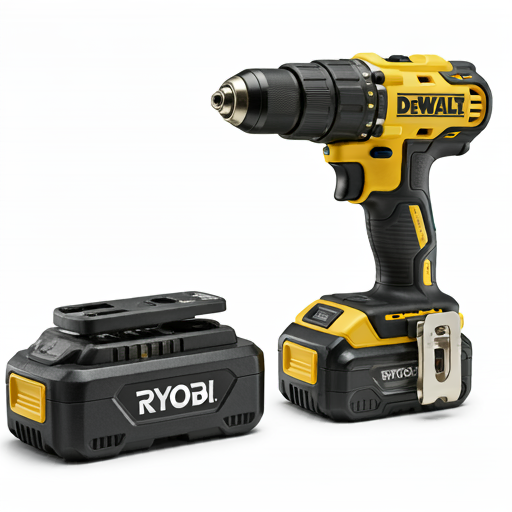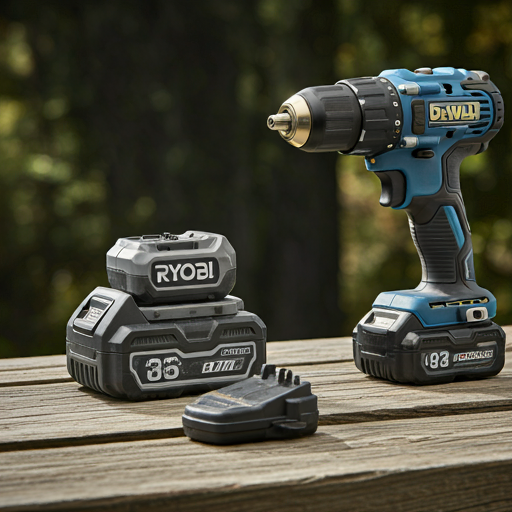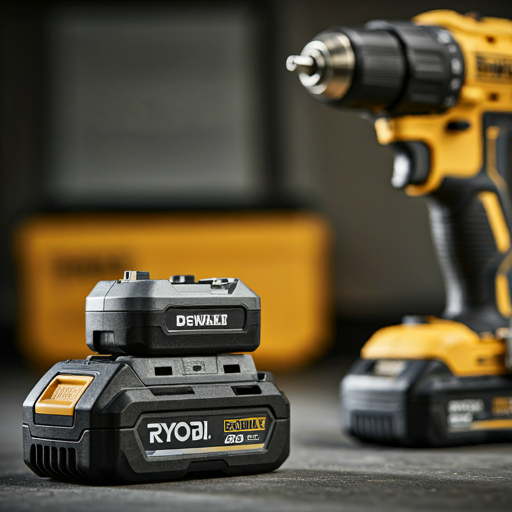The Ryobi battery to Dewalt tool conversion can boost productivity for professionals and DIYers with compatibility issues. Making a Ryobi battery compatible with a Dewalt tool can be helpful and practical. This tutorial covers converting, its benefits, and what to consider for a smooth transaction.
Knowing About the Compatibility of Batteries
Knowing how battery systems operate is essential before beginning the change. Ryobi and Dewalt produce high-quality tools, yet each brand distinguishes itself with its unique battery manufacturing process. Most Ryobi and Dewalt electric tools use an 18V system.
Make sure the voltage of the Ryobi battery and the Dewalt tool match for a successful conversion.
Overheating, damage, or even total tool failure might result from using a battery with the wrong voltage. Verifying both batteries’ amp-hour (Ah) ratings is crucial. Longer usage times are usually associated with more extensive amp-hour ratings; nonetheless, ensuring the best performance is essential to ensure the battery is compatible with the instrument.

Choosing the proper adapter
Getting a battery adapter is the next step once you’ve ensured your Ryobi battery meets your Dewalt tool’s voltage and amp-hour specifications. Battery adapters allow you to use a battery from one manufacturer with tools from another. These adapters are available online and at nearby hardware stores.
Ensure the adapter you choose is compatible with Ryobi and Dewalt products. Reading customer reviews can provide insight into the adapter’s performance and dependability. When a high-quality adapter establishes a secure connection, the Ryobi battery and the Dewalt tool can safely and effectively transfer power.
Conversion preparation
Now that you have the adaptor, it’s time to be ready for the conversion. Get acquainted with the functions and features of the Dewalt tool and the Ryobi battery. You can spot any performance issues with the Ryobi battery by knowing how the Dewalt tool functions with its original battery.
Ensure all tools and the battery’s terminals are clear of debris and clean before connecting. Effective power transfer requires a clean connection. Poor performance or overheating due to dirt or corrosion can harm the battery and the tool.
Attaching the Dewalt Tool to the Ryobi Battery
Now that you’re ready use the adapter to connect the Ryobi battery to the Dewalt tool. Ensure the adapter fits securely by carefully aligning it with the battery terminals. Ensure that you have securely fastened and positioned everything correctly after connecting. A loose connection may result in safety risks and inefficiencies.
Checking the configuration.
After attaching the Ryobi battery to the Dewalt tool, it’s time to test the configuration. Start with light-duty chores to determine how well the Dewalt tool works with the Ryobi battery. This initial run is crucial as it allows you to monitor any unusual noises, vibrations, or overheating that could indicate potential issues.
If the tool performs well in low light, progressively raise the workload to see how it responds to increasingly tricky jobs. Throughout this testing phase, closely monitor the tool and the battery. Stop using them right now and troubleshoot any symptoms of distress, such as unusual noises or excessive heat.
Advantages of Making a Dewalt Tool Out of a Ryobi Battery
There are various benefits to converting a Ryobi battery to function with a Dewalt. Saving money is one of the most significant advantages. The cost of purchasing extra Dewalt batteries can be high for many customers. You can maximize the equipment you already have and save money by modifying your current Ryobi batteries.
The ease of using a single battery system for several tools is an additional benefit. It’s easier to operate with a single battery type if you frequently swap between tools. You can keep working on your projects because you won’t have to stop to change batteries or look for the proper charger. Increased productivity may result from this efficiency, mainly when working on urgent projects.
Safety Points to Remember
Although there are many advantages to converting a Ryobi battery for use with a Dewalt tool, it’s crucial to weigh the hazards. Priority one should always be safe. Especially if the battery or equipment isn’t made for this kind of application, modifying them can result in unanticipated problems. You should carefully evaluate the risks of overheating, electrical shorts, and battery damage.
Continuously monitor for discomfort when using a Ryobi battery with a Dewalt tool. Stop using the instrument immediately if it starts acting strangely, such as overheating, producing odd noises, or performing poorly. Additionally, refer to the user instructions for the Dewalt tool and the Ryobi battery for advice or caution.
Implications for the Warranty
The effect on warranties is another crucial factor to take into account. Using an unconventional battery may void the warranty of a Dewalt tool. This suggests that the manufacturer may not cover tool repairs. Consider this risk before converting if you use your Dewalt tools extensively for work-related tasks.
Longevity Maintenance
Regular maintenance is essential for your Ryobi battery and Dewalt equipment to last a long time. After using the Ryobi battery with the Dewalt tool, examine the adapter and connections for wear or damage. Maintaining clean terminals and ensuring all connections are safe can increase the lifespan of your equipment.

Conversion Alternatives
Think about other options. If modifying a battery to use a Dewalt tool is more complex than expected, or if safety issues are a significant concern, consider other options.
One simple solution that guarantees peak performance without the trouble of adjustments is to purchase Dewalt-specific batteries. While the initial cost might be higher, Dewalt-specific batteries guarantee compatibility and dependability.
Investigating multi-brand systems is a further alternative. Several manufacturers create products that work with different kinds of batteries to increase flexibility without requiring conversions. Investigating these substitutes may provide fresh approaches to simplifying your toolkit.
Final Thoughts
In conclusion, making a Ryobi battery compatible with a Dewalt tool might be helpful and effective in making the most of your current resources. Through comprehension of battery specs, acquisition of the appropriate adapter, and attentive performance monitoring, you can effectively modify your tools to improve their performance.
Weighing the possible hazards, such as safety issues and warranty ramifications, is crucial. The appropriate equipment is essential for confidently completing any project, regardless of whether you decide to invest in Dewalt batteries or continue with the conversion.
FAQ
1. Would a Ryobi battery work with my Dewalt tools?
You can use the right switch to make a Ryobi battery work with a Dewalt tool if both tools run on 18V.
2. Should I check anything before I start the conversion?
Ensure the Ryobi battery’s power and amp hours match what the Dewalt tool needs. Clean every terminal to make the link safer.
3. How can I ensure a secure connection between the Dewalt tool and the Ryobi battery?
When using a cell adapter, ensure it fits the tool and battery well. To keep people safe, make sure that all of the links are tight.
4. What are the benefits of this conversion?
By eliminating the need for extra Dewalt batteries and letting you use a single battery system for multiple tools, battery switching makes things more efficient.
5. If I change the battery, will it affect the guarantee on my tool?
Using a battery that isn’t standard could void the guarantee on your Dewalt tool. If problems happen, you may have to pay for repairs.
For More Tips Please Visit Our Homepage.

